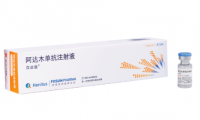-
New Hantavirus Rapid Test Paves Way for Early Outbreak Control
- Source: drugdu
- 228
- March 2, 2024
-
New Alzheimer’s Detecting Blood Tests Perform across Broad Range of Races and Ethnicities
- Source: drugdu
- 384
- March 2, 2024
-
Nuvalent Granted FDA Breakthrough Therapy Designation for Non–Small Cell Lung Cancer Drug
- Source: drugdu
- 301
- March 2, 2024
-
FDA Issues Refusal to File Letter to Theratechnologies for sBLA Seeking Approval of Intramuscular Administration of Trogarzo
- Source: drugdu
- 273
- March 2, 2024
-
New digital iTalkBetter app significantly improves speech in stroke patients
- Source: drugdu
- 249
- March 2, 2024
-
‘Top-down’ treatment strategy dramatically improves outcomes for Crohn’s patients
- Source: drugdu
- 412
- March 2, 2024
-
Henlius Adalimumab Biosimilar Received sNDA Acceptance Notification from the NMPA
- Source: drugdu
- 374
- March 2, 2024
-
AstraZeneca’s “CD19/CD3 dual antibody” receives clinical approval in China
- Source: drugdu
- 313
- March 2, 2024
-
World’s First Low-Cost, High-Throughput, Near-Patient Molecular Diagnostic Test System Dramatically Reduces Wait Times
- Source: drugdu
- 327
- February 29, 2024
your submission has already been received.
OK
Subscribe
Please enter a valid Email address!
Submit
The most relevant industry news & insight will be sent to you every two weeks.













